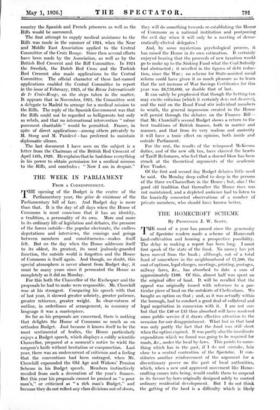THE WEEK IN PARLIAMENT
FROM A CORRESPONDENT.
THE opening of the Budget is the centre of the Parliamentary year, the piece de resistance of the Parliamentary bill of fare. And Budget day is more than that. It is the.day of all days when the House of Commons is most conscious that it has an identity, a tradition, a personality of its own. More and more in its ordinary life of legislation and debates, the pressure of the forces outside—the popular electorate, the endless deputations and interviews, the comings and goings between members and constituencies—makes itself felt. But on the day when the House addresses itself to its oldest, its greatest, its most jealously-guarded function, the outside world is forgotten and the House of Conamons is itself again. And though, no doubt, this special atmosphere is never absent from Budget day, it must be many years since it permeated the House as completely as it did on Monday.
For this both the Chancellor of the Exchequer and the proposals he had to make were responsible. Mr. Churchill was at his strongest. Comparing his speech with that of last year, it showed greater sobriety, greater patience, greater reticence, greater weight. In clear-cutness of outline, in orderliness of arrangement, in economy of language it was a masterpiece.
So far as his proposals are concerned, there is nothing that delights the House of Commons so much as an orthodox Budget. Just because it knows itself to be the most sentimental of bodies, the House particularly enjoys a Budget speech, which displays a .coldly scientific Chancellor, prepared at a moment's notice to wield the surgeon's knife without hesitation or compunction. Last year, there was an undercurrent of criticism and a feeling that the conventions had been outraged, when Mr. Churchill expounded the Old Age and Widows' Pension Scheme in, his. Budget speech... Members instinctively recoiled from such a decoration of the year's finance. But this year his proposals cannot be praised as " a poor man's," or criticized as " a rich man's Budget," and because they do not reflect any class divisions out-of-doors, they will do something towards re-establishing the House of Commons as a national institution and postponing the evil day when it will only be a meeting of demo- cratically-elected delegates !
And, by some mysterious psychological process, it has raised the House in its own estimation. It certainly enjoyed hearing that the proceeds of new taxation would go to make up to the Sinking Fund what the Coal Subsidy had abstracted ; it revelled in the figures of debt reduc- tion, since the War ; no scheme for State-assisted social reform could have given it so much pleasure as to learn that the net increase of War Savings Certificates for this year was £6,750,000, or double that of last.
It can safely be prophesied that though the betting-tax may excite criticism (which it certainly dce3 not deserve), and the raid on the Road Fund stir individual members to wrath, the general impression created in the House will persist through the debates on the Finance Bill— that Mr. Churchill's second Budget shows a return to the best traditions of British finance, both in matter and manner, and that from its very realism and austerity it will have a tonic effect on opinion, both inside and outside Parliament.
For the rest, the results of the reimposed McKenna duties, and of the new silk tax, have cheered the hearts of Tariff Reformers, who feel that a shrewd blow, has been struck at the theoretical arguments of the . academic Free Trader.
Of the first and second day Budget debates little need be said. On Monday deep called to deep in the persons of the three ex-Chancellors in the House ; but, alas ! the good old tradition that thereafter the House rises Was not maintained, and a depleted audience had to listen to the hurriedly concocted observations of a number of private members, who should have known better.














































 Previous page
Previous page